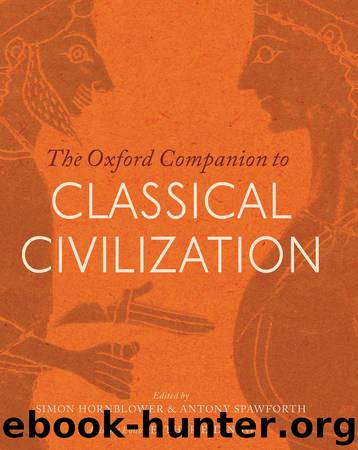The Oxford Companion to Classical Civilization (Oxford Companions) by Simon Hornblower & Antony Spawforth & Esther Eidinow

Author:Simon Hornblower & Antony Spawforth & Esther Eidinow [Hornblower, Simon]
Language: eng
Format: azw3
ISBN: 9780198706779
Publisher: OUP Oxford
Published: 2014-09-10T16:00:00+00:00
K
kingship (basileia) The Mycenaean political system (see MYCENAEAN CIVILIZATION) was monarchic, with the king (wanax) at the head of a palace-centred economy; the 10th-cent. BC ‘hero’s tomb’ at *Lefkandi may imply some limited continuity into the Dark Age. Kingship appears to have been rare later: *Homer borrows elements from Mycenae and the near east, but seems essentially to be describing an aristocratic world, in which the word basileus is often used in the plural of an office-holding nobility. The earliest true monarchies were the 7th–6th-cent. *tyrannies, which were regarded as aberrations; the Spartan dual ‘kingship’ (see SPARTA) is a form of hereditary but non-monarchic military leadership. The Classical period knew kingship only from myth and as a *barbarian form of rule, found in tribal areas and in the near east. *Sophists established a theoretical table of constitutions, with kingship and tyranny as the good and bad forms of monarchy, opposed to the rule of the few and the rule of the many (see OLIGARCHY; DEMOCRACY, ATHENIAN; POLITICAL THEORY). In the 4th cent. BC, developments in *Thessaly (Jason of Pherae), *Syracuse (*Dionysius I and Dionysius II), Caria (Mausolus), and *Cyprus (Nicocles and Evagoras), and especially the rise of Macedon under *Philip II, demonstrated the practical importance of monarchy; and *Plato, *Xenophon, and *Isocrates elaborated theories justifying kingship.
After *Alexander the Great, monarchy became a dominant form of government in the Greek world. The Hellenistic monarchies (see GREECE, PREHISTORY AND HISTORY; HELLENISM) controlled vast territories by conquest (‘land won by the spear’), and often made use of existing local administrative practices, presenting themselves as successors to earlier kings; they encouraged and adapted indigenous forms of king-worship (see RULER-CULT). In practice monarchies were hereditary, and claims were made to divine descent. In Greek cities the forms of king-worship were based on the idea of the king as saviour and benefactor (see EUERGETISM), or new founder of the city: the king and sometimes his family were living gods to be worshipped with temples, cult statues, and festivals. In the free cities such honours were often diplomatic, and reflected the needs of alliances. Roman proconsuls also found themselves honoured; and the emperors accepted and systematized emperor-worship in the Greek provinces of the empire.
A philosophical theory of monarchy developed in the early Hellenistic period: philosophers were often welcomed as advisers at court, and representatives from all major philosophical schools except the *Cynic are known to have written treatises On Kingship. These seem to have rested on a common theoretical basis: kingship was ‘rule without accountability’; it was justified by the perfect virtue of the king, which should be exemplified in a series of actions towards his subjects. The main virtue was love of his subjects (philanthrōpia); others were beneficence (euergesia), justice, self-control, wisdom, foresight, courage. Though the king need not be a philosopher, he should listen to their advice. The king’s actions would ensure the love of his subjects. The doctrine of the king as ‘living law’ was not part of the theory, which was singularly weak in legal justification.
Download
This site does not store any files on its server. We only index and link to content provided by other sites. Please contact the content providers to delete copyright contents if any and email us, we'll remove relevant links or contents immediately.
| Africa | Americas |
| Arctic & Antarctica | Asia |
| Australia & Oceania | Europe |
| Middle East | Russia |
| United States | World |
| Ancient Civilizations | Military |
| Historical Study & Educational Resources |
Mythos (2019 Re-Issue) by Stephen Fry(1565)
Alexander the Great by Robin Lane Fox(1357)
On Sparta (Penguin Classics) by Plutarch(1188)
Antigone Rising: The Subversive Power of the Ancient Myths by Helen Morales(1140)
Persian Fire by Tom Holland(1080)
The Last Days of Socrates by Plato & Christopher Rowe & Plato(1014)
The Classical World: An Epic History From Homer to Hadrian by Robin Lane Fox(1006)
Cicero by Anthony Everitt(987)
The Athenian Constitution (Classics) by Aristotle(941)
Antigone Rising by Helen Morales(841)
The Greek World(817)
The Riddle of the Labyrinth(816)
The Story of the Greeks (Yesterday's Classics) by Guerber H. A(796)
The Homeric Hymns (Penguin Classics) by Homer(754)
The End of the Bronze Age by Robert Drews;(744)
The Eudemian Ethics (Oxford World's Classics) by Kenny Anthony(741)
Guide to Greece by Pausanias(726)
A History of My Times (Classics) by Xenophon(703)
Lords of the Sea: The Epic Story of the Athenian Navy and the Birth of Democracy by John R. Hale(701)
